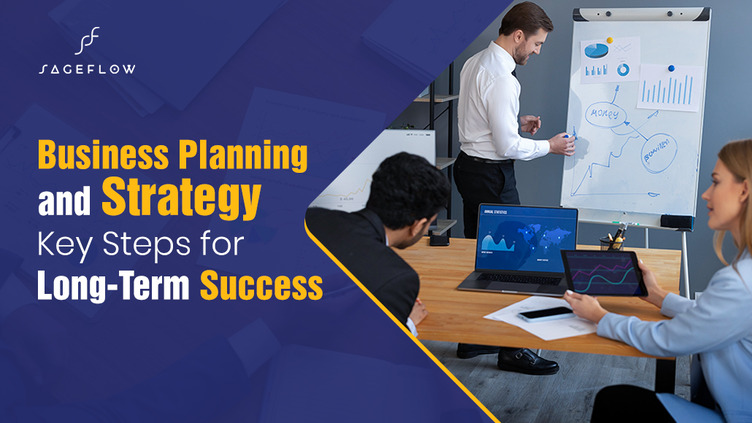Well-crafted business strategy and planning are the backbone of long-term success. Without a clear direction, businesses struggle to grow, adapt, and stay competitive. Customers or clients expect reliability, innovation, and value, which only a strong strategy can consistently deliver.
Effective business planning goes beyond setting goals. It involves understanding market trends, identifying opportunities, and preparing for challenges. Companies that fail to plan often face inconsistent revenue, customer dissatisfaction, and operational inefficiencies.
This guide will explore the key steps to building a solid business strategy that balances short-term gains with long-term vision. If you plan to launch a startup or scale an existing business, a strategic plan will help you make informed decisions.
What is Business Strategy and Planning?
Business strategy and planning give a company its direction and help it stay competitive and grow sustainably. A strong strategy outlines clear goals, identifies market opportunities, and sets a roadmap for success. Without a plan, companies risk losing focus, wasting resources, and falling behind competitors.
Customers today demand efficiency, innovation, and value. Businesses that lack a solid strategy often struggle to meet these expectations. This leads to inconsistent service, poor decision-making, and financial instability. With a well-structured strategies plan, you can anticipate challenges, adapt to changes, and create long-term value for the key stakeholders.
The fundamental aspect is to align business goals with customer needs while staying ahead of industry trends. Whether launching a startup or scaling an enterprise, strategic planning ensures every decision contributes to sustainable success. As a budding business owner, you must thrive in a competitive world with a clear, actionable plan.
What Is Long-Term and Short-Term Business Strategy Planning?
Short-term and long-term business development growth strategies serve different purposes but work together to drive success.
A short-term strategy focuses on immediate goals:
- Boosting sales
- Improving customer service
- Or launching a marketing campaign.
It helps businesses react to market trends and solve urgent challenges. However, relying only on short-term plans can lead to inconsistent growth and missed opportunities.
A long-term strategy, on the other hand, sets a vision for sustainable success. It includes brand positioning, market expansion, and innovation. Businesses that lack long-term planning often struggle with direction. Building customer trust and lasting value becomes quite challenging for them.
Now, the question is, which one is better? Neither works alone. Businesses need short-term wins to stay afloat and long-term goals to stay relevant. The best approach balances both, meeting immediate customer needs while building a future-proof business. A strong strategy ensures customers get consistent value today and for years.
Key Steps in Business Planning and Strategy
Success in business does not happen by chance. It results from careful planning, innovative strategies, and the ability to adapt. Customers expect businesses to understand their needs, provide solutions, and stay ahead of the competition.
Follow these steps to ensure your business remains strong, focused, and ready to grow.
-
Market Analysis & Industry Research
You can’t serve customers well if you don’t understand their needs. Market analysis helps you identify trends, customer preferences, and competitor strategies. Are customers frustrated with slow service? Do they want better pricing?
With proper research, you can get the right insights, make informed decisions, improve your offerings, and position your business effectively. When you know the market inside out, you can anticipate customer needs before they even voice them, creating solutions that truly matter.
-
Defining Business Goals & Objectives
Without clear goals, businesses drift aimlessly. Customers want reliable brands that stay focused and deliver consistent value. Setting clear objectives ensures your business moves in the right direction.
Well-defined goals help you track progress, whether it’s improving customer service, increasing sales, or expanding your reach. When your business has a strong purpose, your customers will notice. They trust companies that know where they are headed and how they plan to get there.
-
Developing Business Growth Strategies
Growth does not just happen overnight. It requires a solid strategy. Customers expect businesses to evolve, offer new solutions, and improve experiences. Development strategies may involve expanding into new markets, launching innovative products, or strengthening customer relationships.
The key is to align your expansion plans with what customers truly want. If your business grows without considering their needs, customers will look elsewhere. Strong business growth strategies are all you need to stay ahead. This will also ensure that customers remain at the heart of your success.
-
Business Development Strategy & Implementation
A great strategy means nothing without execution. Here is a fact for you.
Customers don’t just care about big promises; they want results. Business development focuses on turning plans into action.
This step involves marketing, sales strategies, and operational improvements to deliver real value. Do customers struggle with poor service? Fix it. Are they looking for a seamless shopping experience? Improve it. Implementation means ensuring your business runs efficiently while staying focused on customer satisfaction. Strong execution turns ideas into success stories.
-
Risk Assessment & Contingency Planning
Customers value reliability. If your business isn’t prepared for setbacks, they will eventually lose trust. Risk assessment helps identify potential challenges, from economic downturns to supply chain disruptions.
In this context, contingency planning can ensure you have solutions in place before problems arise. Whether securing alternative suppliers or having a financial backup plan, being prepared builds confidence.
Customers appreciate businesses that stay strong, even in tough times. A company that plans for risks earns long-term loyalty as a reward.
How Business Strategy And Consulting Helps Your Business Success?
Running a business is challenging. Markets shift, competitors innovate, and customer expectations keep evolving. Without a clear strategy, it’s easy to get stuck, waste resources, or miss growth opportunities.
Business strategy consulting helps you stay on track, make smart decisions, and maximise your potential.
This is how you can transform your business:
-
Gaining Clarity and Direction
Many businesses struggle because they lack a clear roadmap. Consultants analyse your business, industry trends, and customer needs to provide a focused strategy. They help you define your vision, set achievable goals, and outline the steps to reach them. Without a strategic plan, businesses often waste time on unproductive efforts.
Customers notice when a company lacks direction—service becomes inconsistent, messaging feels scattered, and growth stalls. A consultant ensures every move aligns with long-term success, keeping your business on course.
-
Identifying Growth Opportunities
Opportunities are everywhere, but not all of them are worth pursuing. Many businesses miss out on growth because they don’t know where to look or how to capitalise on market trends. Consultants bring fresh perspectives, conduct deep market research, and pinpoint profitable opportunities you might have overlooked.
They help you scale smartly, whether by expanding into new markets, refining your product offerings, or optimising operations. Customers appreciate businesses that continuously evolve, offering better solutions that more effectively meet their needs.
-
Improving Efficiency and Profitability
Every business has inefficiencies. There are processes that waste time, unnecessary costs, or marketing strategies that don’t convert. Expert business consultants identify these weak spots and offer solutions to scale operations and boost profitability. When your business runs efficiently, customers benefit from improved experiences.
With a professional, you can streamline workflows, eliminate bottlenecks, and implement data-driven decisions that maximise results. The outcome? A more substantial, profitable business that delivers consistent customer value while staying ahead of competitors.
Key Skills for Business Success
In the multifaceted and dynamic world of business success, having various skills is the key to success. Whatever your role, these essential skills can contribute to overall organisational efficiency.
We have identified these 5indispensable skills that you need:
-
Communication: Building Strong Connections
If customers don’t understand you, they won’t trust you. Clear communication bridges the gap between what you offer and what they need. Whether you’re pitching an idea, handling complaints, or marketing your product, your words must resonate.
Customers will appreciate your business if it listens, explains solutions simply, and responds promptly. Strong communication builds confidence, reduces misunderstandings, and keeps customers engaged. The more effectively you connect, the more loyal they become.
-
Problem-Solving: Turning Challenges into Opportunities
Your customers will come to you because they have a problem. Can you fix it better than anyone else? Problem-solving is about identifying pain points and offering real solutions.
Whether improving a product, streamlining a process, or handling customer complaints, a problem-solver always wins. Businesses that solve issues efficiently earn trust and repeat business. Customers will see you as a reliable go-to expert if you anticipate challenges before they arise.
-
Leadership: Inspiring Growth and Innovation
Great businesses evolve. Leadership is about inspiring progress and plays a vital role in development management. Do you have a team, or are you a solo entrepreneur? Strong leadership skills allow you to make bold decisions, motivate others, and adapt to change.
Customers look for brands that innovate, take responsibility, and stand by their values. A wise leader stays ahead of industry shifts, acts smartly, and ensures mutually beneficial growth.
-
Financial Management: Keeping the Business Thriving
Without smart money management, even the best business ideas fail. Financial skills help you price products correctly, control expenses, and invest wisely. Customers care about value! They want fair pricing, quality service, and a strong business.
If your finances are a mess, it affects everything: service, product quality, and trust. A business that manages cash flow well can expand and provide a consistently great customer experience.
-
Adaptability: Staying Ahead in a Fast-Changing World
Customer needs shift, trends evolve, and industries transform overnight. Adaptability is what keeps businesses relevant. Can you tweak your services, upgrade your technology, or rethink strategies when the market demands?
Businesses that resist change lose customers to those that innovate. Customers appreciate companies that evolve to meet their needs. If you stay flexible, embrace change, and respond quickly, you will thrive and achieve flying success.
Essential Concepts in Strategic Planning
Strategic planning in business is a process in which an organisation’s leaders define its future vision and identify its objectives and goals. This process includes a series of concepts that help achieve the stated vision.
These concepts in strategic planning can make it forward-looking and effective:
-
Vision and Mission: The Compass of Success
Your business needs a clear vision and mission—they shape everything you do. A vision defines where you are headed, while a mission explains how you will get there. Without them, businesses drift, struggling to connect with customers.
When people purchase products, they don’t just buy. They invest in brands that align with their values. A strong mission reassures customers they are making the right choice. It’s about creating experience strategies that drive trust and loyalty.
-
Competitive Advantage: Standing Out in the Crowd
Customers have endless choices. They won’t mind going elsewhere if you don’t offer something unique. In this regard, competitive advantage is what makes you the obvious choice. Maybe you can provide faster service, superior quality, or unbeatable convenience. You must solve their problems better than your competitors.
It’s essential to identify what makes you different in a saturated market. You must communicate this clearly and ensure that every interaction reinforces why your business is the best choice.
-
Market Analysis: Knowing Your Customers Inside Out
You can’t serve your customers well if you don’t truly understand them. Market analysis reveals who they are, what they want, and what frustrates them.
Are they tired of complicated processes? Do they need affordability or premium quality?
Studying market trends, competitors, and customer behaviours gives you insights that shape better decisions. Instead of guessing what works, you create products, services, and marketing strategies that genuinely resonate.
Customers notice when a business gets them, and that’s precisely what builds loyalty.
-
Strategic Goals: Setting a Clear Path to Growth
Without clear goals, businesses chase opportunities blindly, wasting time and resources. Strategic goals provide direction, ensuring every decision aligns with long-term success. Maybe your customers want faster delivery, better support, or eco-friendly products. Your goals should address these needs while keeping your business profitable.
Break them down into actionable steps and track progress. Customers appreciate businesses that evolve to better serve them, and clear goals help you do that.
-
Adaptability: Thriving in a Changing Market
Markets shift, trends change, and customer expectations also change. Businesses that stay rigid get left behind. Adaptability is not merely an advantage – specifically, it’s survival. Customers expect brands to keep up with their needs through technology, better service, or fresh ideas.
Pay attention to feedback, monitor industry changes, and be willing to pivot when needed. If your competitors innovate while you resist change, customers will move on.
For Informed Business Strategy And Planning, Contact SageFlow!
Success in a rapidly evolving business landscape demands a well-structured strategy and the ability to adapt. At SageFlow, we empower leaders and organisations to build a sustainable future. Our adept professionals help you navigate change, unlock potential, and drive measurable results.
Whether you need to refine your organisational structure, enhance leadership capabilities, or develop a roadmap for long-term growth, we are here to guide you. Our expertise ensures that your business survives and thrives in competitive markets.
Let’s shape your organisation’s future together. Contact SageFlow today and take the first step toward informed business strategy and planning and sustainable success.







